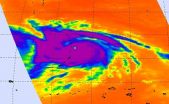INFORMATION:
Notes to editor
* Pritchard-Jones K. et al. Doxorubicin omission from the treatment of stage II-III, intermediate-risk histology Wilms' tumour: results of the SIOP WT 2001 randomised trial, Lancet (2015), DOI: 10.1016/S0140-6736
** About 1 in 20 children treated with doxorubicin experience heart problems in early adulthood. The risk of heart problems in older adults is not yet known.
*** The standard treatment is surgery and chemotherapy, with radiotherapy given to stage III tumours. After the operation to remove their kidney tumour, when the tumour stage is known, children were randomly assigned to receive their chemotherapy either with or without doxorubicin.
For more information about the trial visit: http://www.cancerresearchuk.org/about-cancer/find-a-clinical-trial/a-trial-looking-at-treatment-for-children-and-young-people-with-kidney-cancer-including-wilms-tumour
For more information about Cancer Research UK Kids & Teens visit: http://www.cancerresearchuk.org/kidsandteens
About Cancer Research UK
Cancer Research UK is the world's leading cancer charity dedicated to saving lives through research.
Cancer Research UK's pioneering work into the prevention, diagnosis and treatment of cancer has helped save millions of lives.
Cancer Research UK receives no government funding for its life-saving research. Every step it makes towards beating cancer relies on every pound donated.
Cancer Research UK has been at the heart of the progress that has already seen survival rates in the UK double in the last forty years.
Today, 2 in 4 people survive cancer for at least 10 years. Cancer Research UK's ambition is to accelerate progress so that 3 in 4 people will survive cancer within the next 20 years.
Cancer Research UK supports research into all aspects of cancer through the work of over 4,000 scientists, doctors and nurses.
Together with its partners and supporters, Cancer Research UK's vision is to bring forward the day when all cancers are cured.
For further information about Cancer Research UK's work or to find out how to support the charity, please call 0300 123 1022 or visit http://www.cancerresearchuk.org. Follow us on Twitter and Facebook.
Less intensive chemo avoids irreversible side effects in children's cancer
2015-07-10
(Press-News.org) CHILDREN with a rare type of cancer called Wilms' tumour who are at low risk of relapsing can now be given less intensive treatment, avoiding a type of chemotherapy that can cause irreversible heart problems in later life.
The move follows the results of a Cancer Research UK trial, published in the Lancet* today (Thursday), showing that the drug doxorubicin can be safely omitted from treatment without affecting patients' chances of survival.
Wilms' tumour is a type of kidney cancer that affects around 80 children a year in the UK, most under the age of seven. Until now, about one half of these patients would have received doxorubicin as part of their treatment, which carries a small but significant risk of heart problems in later life**. Now only about one quarter of children - those at the greatest risk of relapse - need the drug.
Doxorubicin is helpful in treating many types of cancer. But with around nine in 10 children with Wilms tumour now cured, doctors wanted to find out whether it could be safely left out from the treatment of those who had a low chance of relapse, without affecting survival chances.
583 children with stage II or stage III Wilms' tumour, who were at intermediate risk of relapsing, took part in the 10 year trial from 2001-2011 across 26 European countries***.
The results showed that 96.5 per cent of children whose treatment included doxorubicin survived for five years or more, compared with 95.8 per cent of children who didn't receive the drug. Although there were slightly more relapses among the children who avoided doxorubicin, they could all be successfully re-treated, meaning there was no impact on the overall risk of death.
The researchers are now carrying out further work, funded by Cancer Research UK, to pinpoint genetic changes in tumour samples from these patients that could be used to better predict the chance of relapse, so treatment can be tailored accordingly.
Lead author Professor Kathy Pritchard-Jones, a Cancer Research UK-funded researcher at the Institute of Child Health, University College London and consultant oncologist at Great Ormond Street Hospital in London, said: "Thanks to the results of this trial fewer children with this disease will have to have treatment that could cause them lifelong side effects without much benefit. It's taken researchers in 26 countries nearly 10 years to gather the data to support this theory, and none of this would have been possible without the 583 children who took part in the trial and the families that supported them."
Professor Pam Kearns, professor of paediatric oncology at the University of Birmingham and Cancer Research UK's senior clinical advisor, said: "This is a very important trial that has changed clinical practice for this type of Wilms' tumour. Around nine in 10 children with the disease survive with current treatments, so it is difficult to consider reducing treatment, but minimising the side effects that occur later in life is crucial. Thanks to trials like this we're learning how we can both improve treatments for children's cancers alongside reducing the damaging side effects.
"Whilst treatment for Wilms' tumour is very successful, overall cancer remains the biggest killer of children in the UK so our work is still far from done. Our new campaign - Cancer Research UK Kids & Teens - will help us fund more research to find cures and kinder treatments to beat children's cancer in the future."
ELSE PRESS RELEASES FROM THIS DATE:
Strong family bonds reduce anxiety in young people with lived experience of domestic violence
2015-07-10
Strong relationships with other family members can help raise self-esteem and reduce anxiety for some young people who grow up in homes affected by parental domestic violence.
This is the finding of a study by Doctoral student Catherine Naughton and colleagues from the University of Limerick that will be presented today, Friday 10 July 2015, at the British Psychological Society's Psychology of Women Section's annual conference being held in Windsor.
Catherine Naughton said: "Research has previously shown that strong social bonds can act as a beneficial psychological ...
Diet and exercise does not prevent gestational diabetes in obese women
2015-07-10
A diet and exercise regime for high-risk obese pregnant women, whilst effective in promoting a healthy lifestyle, does not prevent gestational diabetes, finds a study led by King's College London. The findings, published in the Lancet Diabetes and Endocrinology, suggest that programmes promoting healthy behaviours are unlikely to be effective in preventing diabetes in obese women; instead, resources should be directed towards better screening and treatment, including the use of a more stringent threshold for diagnosis.
Obesity rates are highest in developed countries, ...
ECG scans predict kidney disease patients' risk of dying from heart disease
2015-07-10
Highlight
Certain electrocardiogram measures helped investigators identify a subgroup of individuals with chronic kidney disease who had substantially elevated risks of dying from heart disease.
An estimated 26 million people in the United States have chronic kidney disease, and heart disease is the leading cause of death in these patients.
Washington, DC (July 9, 2015) -- Several common measures obtained from electrocardiograms (ECGs) may help clinicians determine a kidney disease patient's risk of dying from heart disease. The findings, which are published in a study ...
Uric acid may lessen women's disability after stroke
2015-07-09
DALLAS, July 9, 2015 -- Uric acid - a chemical at high levels can lead to serious illness - may lessen women's disability after stroke, according to new research in the American Heart Association's journal Stroke.
High levels of uric acid can lead to kidney stones or the inflammatory arthritic condition known as gout and is linked with heart and vascular problems and diabetes. However, in a new study, 42 percent of women treated with uric acid therapy following a stroke had little to no disability after 90 days compared to 29 percent of women treated with a placebo. Women ...
Evidence from past suggests climate trends could yield 20-foot sea-level rise
2015-07-09
When past temperatures were similar to or slightly higher than the present global average, sea levels rose at least 20 feet, suggesting a similar outcome could be in store if current climate trends continue.
Findings published in the journal Science showed that the seas rose in response to melting ice sheets in Greenland and Antarctica, said lead author Andrea Dutton, a University of Florida geochemist.
"This evidence leads us to conclude that the polar ice sheets are out of equilibrium with the present climate," she said.
Dutton and an international team of scientists ...
Nutrition researchers develop the healthy beverage index
2015-07-09
Philadelphia, PA, July 9, 2015 - Researchers at Virginia Tech have developed a new scoring method for assessing beverage intake, the Healthy Beverage Index (HBI). In a report published in the Journal of the Academy of Nutrition and Dietetics they describe how this tool can be used to more accurately evaluate dietary consumption of all types of fluids. They found that higher HBI scores were associated with more favorable lipid profiles, decreased risk of hypertension; and, among men, better C-reactive protein (CRP) levels.
Water consumption is associated with numerous ...
Everyday access to nature improves quality of life in older adults
2015-07-09
Natural environments are known to promote physical, mental, and spiritual healing. People can attain health benefits by spending time outside, often in remote places to "get away from it all." Now research conducted by a University of Minnesota graduate student with a team in Vancouver, B.C., shows that green and "blue" spaces (environments with running or still water) are especially beneficial for healthy aging in seniors.
Published in the journal Health and Place, the study -Therapeutic landscapes and wellbeing in later life: Impacts of blue and green spaces for older ...
Scientists study atmosphere of Venus through transit images
2015-07-09
Two of NASA's heliophysics missions can now claim planetary science on their list of scientific findings. A group of scientists used the Venus transit - a very rare event where a planet passes between Earth and the sun, appearing to us as a dark dot steadily making its way across the sun's bright face - to make measurements of how the Venusian atmosphere absorbs different kinds of light. This, in turn, gives scientists clues to exactly what elements are layered above Venus's surface. Gathering such information not only teaches us more about this planet so close to our own, ...
NASA's Aqua satellite observes Supertyphoon Nangka
2015-07-09
NASA's Aqua satellite passed over Supertyphoon Nangka on July 9 and provided a visible and an infrared view of the large storm.
At 0700 UTC (3 a.m. EDT) on July 9 a typhoon warning was in effect for Agrihan, Pagan and Alamagan in the northern Marianas. A tropical storm warning is in effect for Saipan and Tinian. Nangka passed over Alamagan.
The Atmospheric Infrared Sounder or AIRS instrument aboard NASA's Aqua satellite gathered infrared temperature data on Nangka on July 9 at 03:23 UTC (July 8 at 11:23 a.m. EDT). At the same time, the MODIS instrument took a visible ...
New genomic analysis identifies recurrent fusion genes in gastric cancers
2015-07-09
Studying the gastric cancers of 15 Southeast Asian patients, researchers at The Jackson Laboratory, the Genome Institute of Singapore and other institutions identified five recurrent fusion genes, one of which appears to lead to cellular changes involved in acute gastritis and cancer.
Worldwide, close to a million cases of gastric cancers are diagnosed each year, and some of the world's highest incidence rates are in Asia (particularly in Korea, Japan and China).
The researchers, led by JAX Professor Yijun Ruan, Ph.D., and Axel M. Hillmer, Ph.D., of GIS, published ...

